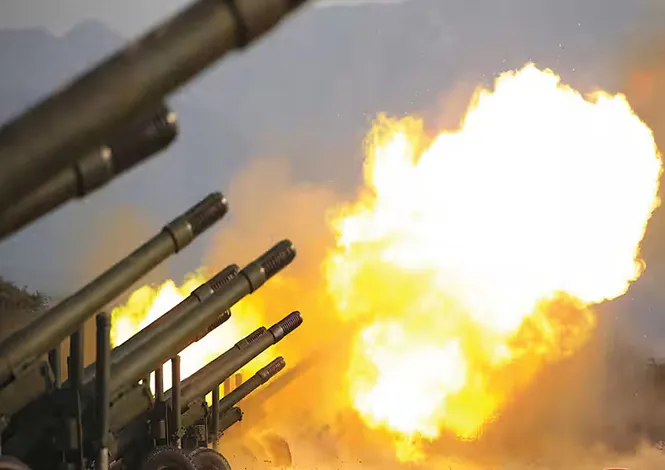-
CENTRES
Progammes & Centres
Location
Pyongyang’s recent live-fire drills could set in motion a series of events with far-reaching consequences for regional stability, diplomacy, and the global economy

On Friday, 5 January, North Korea fired 200 artillery rounds near its disputed western sea boundary with South Korea, in a significant breach of the 2018 military agreement between Pyongyang and Seoul, a pact that was instrumental in reducing military tensions and averting accidental clashes. In a situation that was already tense due to the steady upgrade of Pyongyang’s missile programme, Friday’s firing is likely to result in a further escalation of military tensions on the Korean Peninsula. Referring to the drills as a provocation, Seoul also fired artillery rounds in response later in the day and ordered the evacuation of Yeonpyeong, a front-line island. The firing continued over the weekend with a third round of 60 firings on 7 January.
An important aspect of the agreement was the confidence-building measure that involved the removal of several guard posts within the DMZ and the clearing of landmines in specific areas.
Formally known as the “Agreement on the Implementation of the Historic Panmunjom Declaration in the Military Domain”, or the Comprehensive Military Agreement, the 2018 military agreement was part of a broader effort to reduce military tensions and build mutual trust between the two Koreas. Central to this agreement was the commitment to cease all hostile acts against each other, a move aimed at reducing the risk of armed conflict and accidental military clashes, especially along the heavily fortified Demilitarized Zone (DMZ) and the maritime boundary. This included the establishment of a no-fly zone near the DMZ for various types of aircraft, addressing the potential for airspace violations that could escalate tensions. An important aspect of the agreement was the confidence-building measure that involved the removal of several guard posts within the DMZ and the clearing of landmines in specific areas. In the maritime domain, the agreement sought to transform the disputed western sea border area into a peace zone. The agreement, however, never really lived up to its projected potential. In late 2023, South Korea suspended parts of the agreement after North Korea launched a spy satellite into orbit
While Pyongyang has breached the 2018 agreement several times in the past, with the most recent one being in December 2022, the 5 January drills are significant for two reasons. First, these firings follow closely in the wake of Seoul, Tokyo, and Washington agreeing to and launching a scheme for sharing year-round real-time data on North Korean missiles. The plan was first decided during the trilateral meet at Camp David in August 2023 and launched in December 2023 with the three countries also poised to devise guidelines for a joint nuclear deterrence strategy by the summer of 2024 at the second meeting of the Nuclear Consultative Group. The establishment of a real-time data-sharing mechanism is a substantial step forward in strengthening the missile defense capabilities of the United States (US), South Korea, and Japan.
In the face of North Korea's evolving missile capabilities, the agreement underscores a shared understanding among the three nations that the traditional approach to security must be adapted to effectively counter contemporary threats.
Timely and accurate information about North Korean missile launches is invaluable for planning and executing effective countermeasures with real-time data allowing for quicker decision-making and a more coordinated response to potential threats. It contributes significantly to the deterrence posture of the three nations. In the face of North Korea's evolving missile capabilities, the agreement underscores a shared understanding among the three nations that the traditional approach to security must be adapted to effectively counter contemporary threats. This move is indicative of a strategic alignment in response to a common adversary, signifying a departure from historical tensions and a commitment to regional stability. The development was met with fierce criticism from North Korea which vowed to bolster its war-preparedness.
Second, it is believed that Pyongyang is looking to step up its defense capabilities and also demonstrate the same through repeated provocations along the land and sea border with South Korea to boost its chances of drawing concessions from the US in case Donald Trump is re-elected as President in 2024’s forthcoming US elections. Intelligence reports also indicate that Pyongyang may try to carry out a seventh nuclear test later in 2024 to coincide with the US midterm elections. The two leaders share an interesting relationship with Trump being the first sitting US President to have visited North Korea during his previous term in office. Relations between the two countries during the previous Trump administration were marked by significant fluctuations, featuring both heightened tensions and unprecedented diplomatic engagements. Trump's direct engagement with Kim, including exchanging personal letters, was a departure from the more cautious approach of previous administrations. However, these engagements did not result in a clear roadmap for denuclearisation or a significant change in North Korea's nuclear posture. By the end of Trump's term, the US-North Korea relationship remained complex and unresolved, with the fundamental issues around denuclearisation and sanctions relief still largely unaddressed.
Relations between the two countries during the previous Trump administration were marked by significant fluctuations, featuring both heightened tensions and unprecedented diplomatic engagements.
If North Korea indeed remains true to its threats, South Korea, alongside its allies, particularly the US, would be compelled to respond, potentially leading to a heightened state of military readiness or even countermeasures, which could further aggravate the security of the Korean peninsula. It is also likely to have a substantial impact on the internal politics of the involved countries. In South Korea, it could lead to a hardening of public and political attitudes towards North Korea, impacting the South Korean government's policy and approach to the North. South Korea’s parliamentary elections are also scheduled for April 2024. In North Korea, it could be used by the regime to bolster internal support by projecting strength against external threats.
Pyongyang’s choices, going forward, could not only disrupt the fragile peace in the region but could also set in motion a series of events with far-reaching consequences for regional stability, diplomacy, and the global economy.
Pratnashree Basu is an Associate Fellow at Observer Research Foundation.
The views expressed above belong to the author(s). ORF research and analyses now available on Telegram! Click here to access our curated content — blogs, longforms and interviews.

Pratnashree Basu is an Associate Fellow, Indo-Pacific at Observer Research Foundation, Kolkata, with the Strategic Studies Programme and the Centre for New Economic Diplomacy. She ...
Read More +